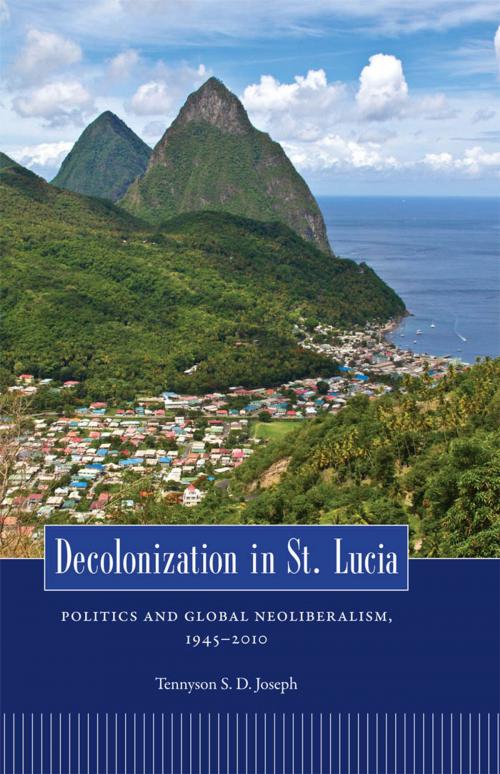Decolonization in St. Lucia
Politics and Global Neoliberalism, 1945–2010
Nonfiction, History, Americas, Caribbean & West Indies, Social & Cultural Studies, Political Science| Author: | Tennyson S. D. Joseph | ISBN: | 9781617031182 |
| Publisher: | University Press of Mississippi | Publication: | August 16, 2011 |
| Imprint: | University Press of Mississippi | Language: | English |
| Author: | Tennyson S. D. Joseph |
| ISBN: | 9781617031182 |
| Publisher: | University Press of Mississippi |
| Publication: | August 16, 2011 |
| Imprint: | University Press of Mississippi |
| Language: | English |
Tennyson S. D. Joseph builds upon current research on the anticolonial and nationalist experience in the Caribbean. He explores the impact of global transformation upon the independent experience of St. Lucia and argues that the island's formal decolonization roughly coincided with the period of the rise of global neoliberalism hegemony. Consequently, the concept of "limited sovereignty" became the defining feature of St. Lucia's understanding of the possibilities of independence. Central to the analysis is the tension between the role of the state as a facilitator of domestic aspirations on one hand and a facilitator of global capital on the other.
Joseph examines six critical phases in the St. Lucian experience. The first is 1940 to 1970, when the early nationalist movement gradually occupied state power within a framework of limited self-government. The second period is 1970 to 1982 during which formal independence was attained and an attempt at socialist-oriented radical nationalism was pursued by the St. Lucia Labor Party. The third distinctive period was the period of neoliberal hegemony, 1982-1990. The fourth period (1990-1997) witnessed a heightened process of neoliberal adjustment in global trade which destroyed the banana industry and transformed the domestic political economy. A later period (1997-2006) involved the SLP's return to political power, resulting in tensions between an earlier radicalism and a new and contradictory accommodation to global neoliberalism. The final period (2006-2010) coincides with the onset of a crisis in global neoliberalism during which a series of domestic conflicts reflected the contradictions of the dominant understanding of sovereignty in narrow, materialist terms at the expense of its wider antisystematic, progressive, and emancipator connotations.
Tennyson S. D. Joseph builds upon current research on the anticolonial and nationalist experience in the Caribbean. He explores the impact of global transformation upon the independent experience of St. Lucia and argues that the island's formal decolonization roughly coincided with the period of the rise of global neoliberalism hegemony. Consequently, the concept of "limited sovereignty" became the defining feature of St. Lucia's understanding of the possibilities of independence. Central to the analysis is the tension between the role of the state as a facilitator of domestic aspirations on one hand and a facilitator of global capital on the other.
Joseph examines six critical phases in the St. Lucian experience. The first is 1940 to 1970, when the early nationalist movement gradually occupied state power within a framework of limited self-government. The second period is 1970 to 1982 during which formal independence was attained and an attempt at socialist-oriented radical nationalism was pursued by the St. Lucia Labor Party. The third distinctive period was the period of neoliberal hegemony, 1982-1990. The fourth period (1990-1997) witnessed a heightened process of neoliberal adjustment in global trade which destroyed the banana industry and transformed the domestic political economy. A later period (1997-2006) involved the SLP's return to political power, resulting in tensions between an earlier radicalism and a new and contradictory accommodation to global neoliberalism. The final period (2006-2010) coincides with the onset of a crisis in global neoliberalism during which a series of domestic conflicts reflected the contradictions of the dominant understanding of sovereignty in narrow, materialist terms at the expense of its wider antisystematic, progressive, and emancipator connotations.















